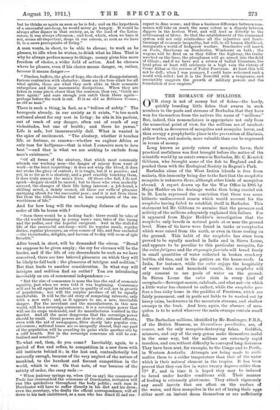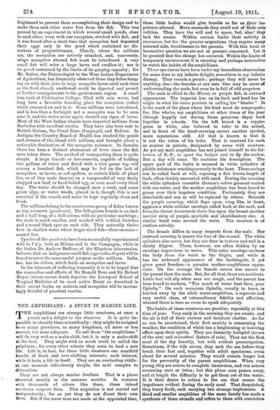THE ROMANCE OF MILLIONS.
OUR story is not of money but of fishes—the hardy, quickly breeding little fishes that swarm in such numbers in the pools and streams of Barbados that they have won for themselves from the natives the name of " millions." But, indeed, this nomenclature is appropriate not only from
the numerical point of view, for the millions are of incalcul- able worth as devourers of mosquitos and mosquito larvae, and thus occupy a prophylactic place in the prevention of filariasis, yellow fever, and malaria, more valuable than can be expressed in terms of money.
Long known as greedy eaters of mosquito larvae, their practical usefulness was first brought before the notice of the scientific world by an estate owner in Barbados, Mr. C. Kenrick Gibbons, who brought some of the fish to England and de- posited them with the Zoological Society in Regent's Park.
Barbados alone of the West Indian islands is free from malaria, this immunity being due to the fact that the anopheles mosquito is unknown there, although other kinds of mosquitos abound. A report drawn up for the War Office in 1905 by Major Hodder on the drainage works then being carried out in St. Lucia expressed the conviction that there was some hitherto undiscovered reason which would account for the anopheles having failed to establish itself in Barbados. This statement led Mr. Gibbons to surmise that the preseuce and activity of the millions adequately explained this failure. For it appeared from Major Hodder's investigation that the anopheles only breeds in natural pools at or near the ground level. None of its larvae were found in tanks or receptacles which were raised from the earth, or even in those resting on the ground. This habit of the anopheles has since been proved to be equally marked in India and in Sierra Leone, and appears to be peculiar to this particular mosquito, for the culex faligans and the slegmuyia fasciata will breed freely in small quantities of water collected in broken crock ery bottles, old tins, and in the gutters on the house-roofs. In India, for instance, while the culex enjoys the hospitality of water tanks and household vessels, the anopheles will only consent to use pools of water on the ground. In Sierra Leone the culex riots in every kind of receptacle—flowerpot-saucer, calabash, and what not—in which a little water has chanced to collect, while the anopheles pre- fers a less risky home in the puddles of Freetown, which are fairly permanent, and in pools not liable to be washed out by heavy rains, backwaters in the mountain streams, and shallow swamps in the bush. And here, again, the absence of mos. quitos is to be noted wherever the main swamps contain small fish.
The Barbadian millions, identified by Mr. Boulenger, F.1I.S., of the British Museum, as Gerardinus poeciloides, are, of course, not the only mosquito-destroying fishes. Goldfish, minnows, and any of the carp genus make themselves useful in the same way, but the millions are extremely rapid breeders, and can without difficulty be conveyed long distances They have been sent, for example, to the Congo and to Perth,. in Western Australia. Attempts are being made to accli- matize them to a colder temperature than that of the water which is their natural element in the tropics. It has been proved that they can live in water twenty degrees colder than 77° F., and in time it is hoped they may be induced to breed under hardier conditions still. Their manner of feeding is extremely gluttonous. They attack vigorously any small insects that are afloat on the surface of the water, and thus mosquitos in the act of laying their eggs either. meet an instant doom themselves or are sufficiently frightened to prevent them accomplishing their design and to make there seek other water free from the fish. This was proved by an experiment in which several small ponds, close to each other, were, with one exception, stocked with fish, and it was found after a short time that mosquitos had deposited their eggs only in the pond which contained no dis- turbers of progenitiveness. Clearly, where the millions are, the mosquitos are actively attacked, and, conversely, where mosquitos abound fish must be introduced. A very small fish will seize a large larva and swallow it; nor is its greed restrained by the limits of its gorging capacity; for Mr. Ballon, the Entomologist to the West Indian Department of Agriculture, has frequently observed these tiny fishes hang- ing on with their jaws to large mosquito larvm until such time as the food already swallowed could be digested and permit of further consignments to the gastronomic region. A small iron tank at Codrington College, filled with rain water, had long been a favourite breeding place for mosquitos (culex) which swarmed on and in it. Some millions were introduced, and in less than a fortnight not a mosquito was to be seen near its and the water never again showed any signs of larvm. Most of the West Indian islands have imported millions from Barbados with excellent results. They have also been sent to British Guiana, the Canal Zone, Guayaquil, and Bolivar. In Antigua the Country Board of Health has stocked the ponds and streams of the island with millions, and brought about a noticeable diminution of the mosquito nuisance. In Jamaica there has been a distinct abatement of fever since the fish were taken there. The method of transporting them is quite simple. A large biscuit- or kerosene-tin, capable of holding two gallons of water and fitted with a wire gauze top, will convey a hundred fish, which may be fed (in the lack of mosquitos, or larvm, or red spiders, or certain kinds of plant lice, or of tiny scale insects) on a teaspoonful of very finely chopped raw beef, or hard-boiled egg, or corn meal every third day. The water should be changed once a week, and some green algae, or water weeds, placed in it, though this is not essential if the vessels and water be kept regularly clean and fresh.
The millions belong to the carnivorous group of fishes known as top minnows (gambusia). The full-grown female is an inch and a half long, of a dull colour, with no particular markings; the male is much smaller, and marked with reddish blotches and a round black spot on each side. They naturally thrive best in shallow water where larger-sized fish—their enemies— cannot live.
Species of the gambusia have been successfully experimented with in I' a`y, both at Milano and in the Campagna, while in the Sudan Dr. Andrew Balfour, of the Khartum laboratories, believes that an indigenous small fish (cyprindon dispar) will be found to serve the same useful purpose as the millions. India, too, has its chatea, which feeds on mosquitos and larvae.
In the interests of suffering humanity it is to be hoped that the researches and efforts of Sir Ronald Ross and Sir Hubert Boyce (whose recent death deprives the Liverpool School of Tropical Medicine of its most active Dean) as described in their recent books on malaria and mosquitos will be increas- ingly fruitful of practical results.



































 Previous page
Previous page